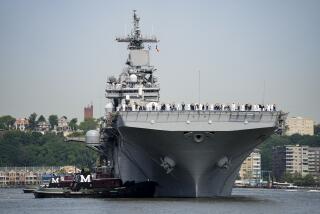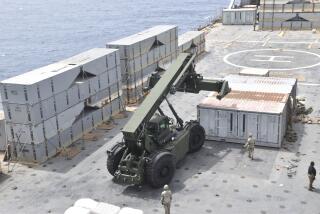Navy Gets Kuwaiti OK to Operate Floating Base in Gulf
- Share via
WASHINGTON — The government of Kuwait, setting aside its expressed concerns about American incursions on its sovereignty, has agreed to let the U.S. Navy operate a barge bristling with weapons inside Kuwaiti territorial waters, the Pentagon confirmed Tuesday.
Kuwait’s change of heart comes after Iranian Silkworm missiles hit three tankers in that nation’s waters in the last six weeks. Those attacks swayed Kuwaiti officials to reconsider earlier decisions to deny U.S. forces access to Kuwaiti bases or territory, Administration officials said.
The barge, about the size of a football field, will serve as a refueling, supply and staging center for Navy helicopters and patrol boats involved in the U.S. tanker escort effort in the Persian Gulf. The platform--joining two others in international waters in the gulf--will improve the reach and maneuverability of U.S. forces protecting U.S.-flag vessels against Iranian attacks, U.S. officials said. Eleven such vessels are Kuwaiti tankers re-registered under the American Flag.
The new station marks a significant expansion of the U.S. presence in the gulf by giving U.S. forces a floating base within 150 miles of the nearest land battlefield in the seven-year-old war between Iran and Iraq. At the same time, the agreement strengthens the symbolic ties between the United States and the tiny Arab nation, which has striven in the past to maintain an arm’s length relationship to avoid antagonizing Iran, the Soviet Union and Shia Muslims in its own country.
The Kuwaitis, in an unprecedented move, have given Washington assurances that the barge will receive protection from Kuwaiti defenses, according to one knowledgeable official. Those defenses, which include U.S.-made Hawk anti-aircraft missiles, would be capable of intercepting Iranian Silkworm missiles that have been fired from mobile bases on the Faw Peninsula, Iraqi territory now occupied by Iran.
However, there are some reservations among U.S. officials about the barge because of its potential as a target of attack.
Defense Secretary Frank C. Carlucci, speaking to reporters last Friday en route to a meeting with European allies in Brussels, said that such a platform in Kuwaiti waters would be “vulnerable” and said of its military advantages: “It doesn’t get you very much.”
But several Pentagon sources said that the barge’s own defensive systems, including Stinger anti-aircraft missiles, would afford substantial protection and that the base would be very useful.
“Attacking those sites would not be easy if they tried,” said one Navy official. “And anyone who tried is not likely to get away with it.”
The new barge is to be towed into the northern Persian Gulf under Navy escort once Washington and Kuwait work out the final details of the deployment. The barge’s exact intended location could not be ascertained Tuesday, but about half of Kuwait’s territorial water lies within the 50-mile range of Iranian Silkworm missiles.
Kuwait last summer requested the re-registration of its tankers under the U.S. flag to obtain American protection against attacks from Iran, which has preyed upon ships of nations, such as Kuwait, that do business with Iraq. But the tiny gulf nation outraged some U.S. officials in July by rejecting, out of fear of greater entanglements, a U.S. proposal to operate minesweeping helicopters from Kuwaiti territory.
That attitude began to change with the recent series of Iranian missile attacks aimed at targets in Kuwaiti waters. On Oct. 15, a Silkworm missile slammed into the U.S.-owned, Liberian-flagged tanker Sungari off the Kuwaiti coast.
The next day a Silkworm hit the U.S.-flagged Kuwaiti tanker Sea Isle City while the ship was in Kuwaiti anchorage. A Kuwaiti offshore loading facility, the Sea Island terminal, was heavily damaged by a missile Oct. 22. Two other Silkworms also have been fired at Kuwaiti terrority and landed in the water.
American officials said that Kuwaiti leaders began to accept the fact that their nation’s proclaimed neutrality in the gulf war had not won it immunity from Iranian attacks.
More to Read
Sign up for Essential California
The most important California stories and recommendations in your inbox every morning.
You may occasionally receive promotional content from the Los Angeles Times.











